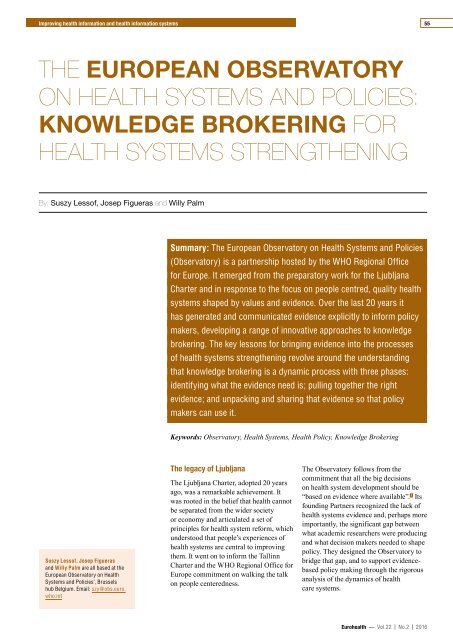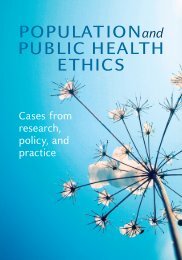EUROHEALTH
Eurohealth-volume22-number2-2016
Eurohealth-volume22-number2-2016
You also want an ePaper? Increase the reach of your titles
YUMPU automatically turns print PDFs into web optimized ePapers that Google loves.
Improving health information and health information systems<br />
55<br />
THE EUROPEAN OBSERVATORY<br />
ON HEALTH SYSTEMS AND POLICIES:<br />
KNOWLEDGE BROKERING FOR<br />
HEALTH SYSTEMS STRENGTHENING<br />
By: Suszy Lessof, Josep Figueras and Willy Palm<br />
Summary: The European Observatory on Health Systems and Policies<br />
(Observatory) is a partnership hosted by the WHO Regional Office<br />
for Europe. It emerged from the preparatory work for the Ljubljana<br />
Charter and in response to the focus on people centred, quality health<br />
systems shaped by values and evidence. Over the last 20 years it<br />
has generated and communicated evidence explicitly to inform policy<br />
makers, developing a range of innovative approaches to knowledge<br />
brokering. The key lessons for bringing evidence into the processes<br />
of health systems strengthening revolve around the understanding<br />
that knowledge brokering is a dynamic process with three phases:<br />
identifying what the evidence need is; pulling together the right<br />
evidence; and unpacking and sharing that evidence so that policy<br />
makers can use it.<br />
Keywords: Observatory, Health Systems, Health Policy, Knowledge Brokering<br />
Suszy Lessof, Josep Figueras<br />
and Willy Palm are all based at the<br />
European Observatory on Health<br />
Systems and Policies’, Brussels<br />
hub Belgium. Email: szy@obs.euro.<br />
who.int<br />
The legacy of Ljubljana<br />
The Ljubljana Charter, adopted 20 years<br />
ago, was a remarkable achievement. It<br />
was rooted in the belief that health cannot<br />
be separated from the wider society<br />
or economy and articulated a set of<br />
principles for health system reform, which<br />
understood that people’s experiences of<br />
health systems are central to improving<br />
them. It went on to inform the Tallinn<br />
Charter and the WHO Regional Office for<br />
Europe commitment on walking the talk<br />
on people centeredness.<br />
The Observatory follows from the<br />
commitment that all the big decisions<br />
on health system development should be<br />
“based on evidence where available”. 1 Its<br />
founding Partners recognized the lack of<br />
health systems evidence and, perhaps more<br />
importantly, the significant gap between<br />
what academic researchers were producing<br />
and what decision makers needed to shape<br />
policy. They designed the Observatory to<br />
bridge that gap, and to support evidencebased<br />
policy making through the rigorous<br />
analysis of the dynamics of health<br />
care systems.<br />
Eurohealth — Vol.22 | No.2 | 2016
















